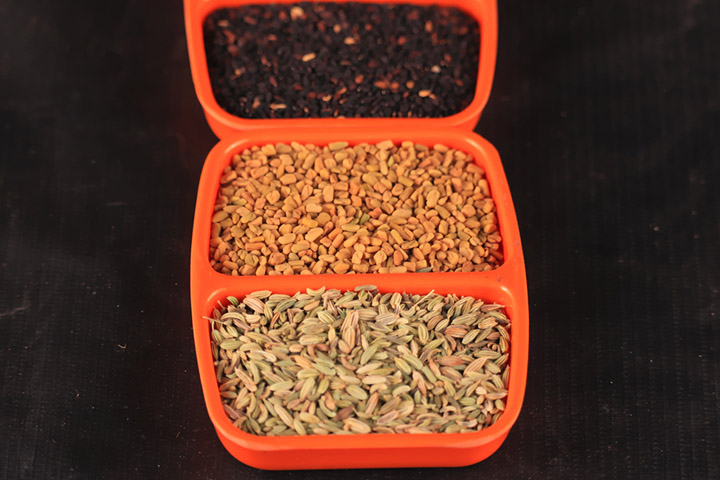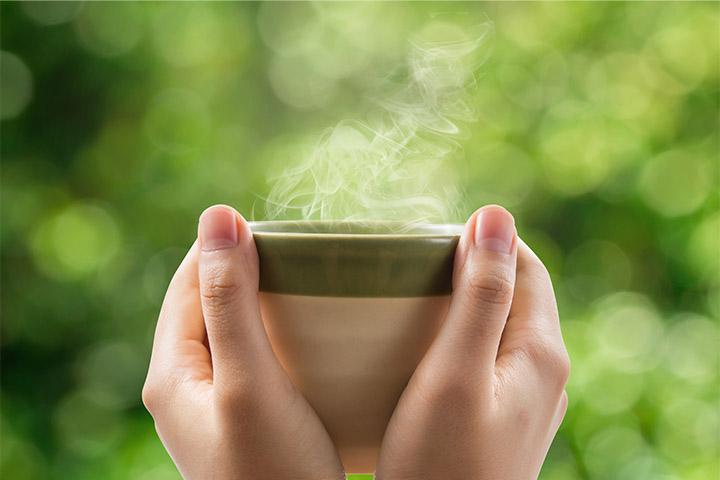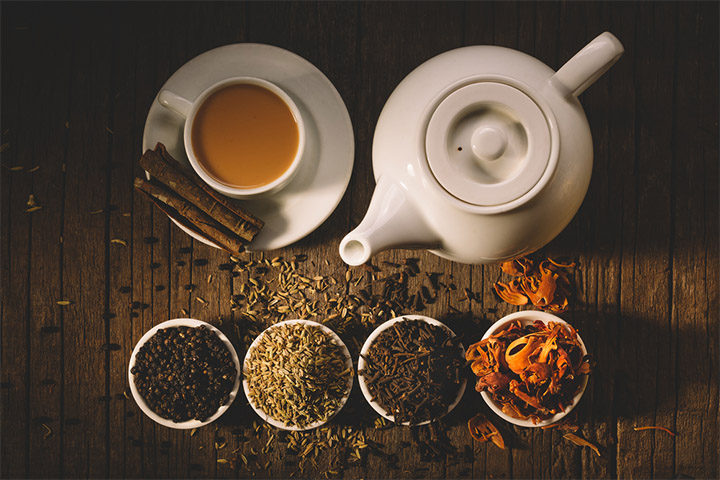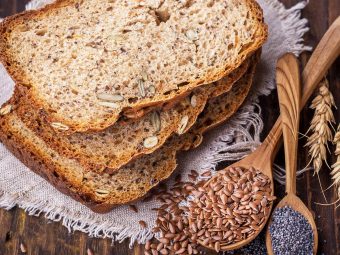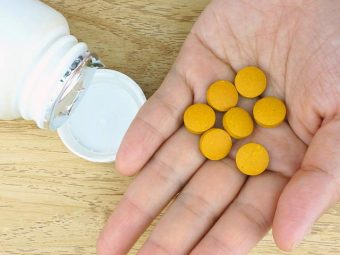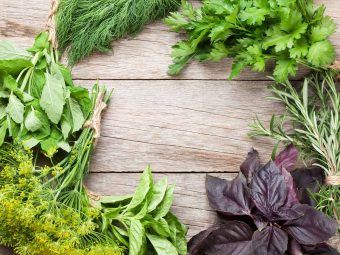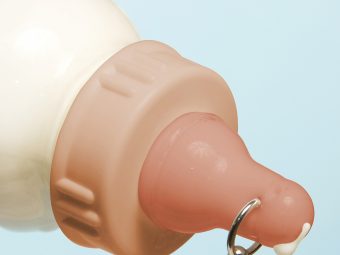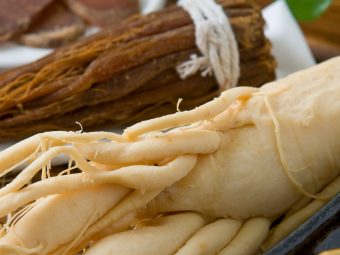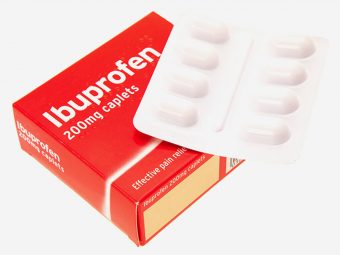
Image: Shutterstock
New moms are often concerned about the sufficiency of breast milk and tend to opt for methods such as mother’s milk tea to improve lactation. Experts state that babies who are exclusively fed breast milk during the initial six months will grow into healthy adults. Breastfeeding needs to continue for up to 12 months. Therefore, most new moms strive to improve their breast milk production to give their babies the best possible nutritional support.
There may be times when a mother’s milk supply starts to decline, leaving her frustrated, heartbroken, and worried about her baby’s nutrition. But, the good news is that there are some effective and natural ways to increase milk production. For example, one of the widely used herbal drinks to improve lactation in new moms is mother’s milk tea.
If you want to explore more about this tea and ways to use it to boost breast milk supply, then read on. We provide important details on mother’s milk tea that could help you make an informed decision when choosing this tea to boost breast milk supply.
What Is Mother’s Milk Tea?
Mother’s Milk Tea is a healthy blend of several herbs that contribute to increased lactation in women. While there are many such herbal tea blends commonly available in the market, and you can quite easily buy them, there is also a method of making the mother’s milk tea or nursing tea at home. In this case, you can choose the loose leaf blends available of various herbs and customize your tea based on your preference and requirements.
Most women who start drinking Mother’s Milk Tea report a significant difference in the breast milk quality and quantity after a few days of consumption. That’s because the mother’s body takes some time to absorb the herbs to start showing the results. Many moms have found Mother’s Milk Tea to be very effective. This has prompted them to continue using the tea for as long as they choose to breastfeed to support healthy infant development.
Organic Mother’s Milk Tea Herbs That Are Good For Improving Lactation
Image: Shutterstock
When educating yourself about Mother’s Milk Tea, you will often come across the term galactagogue. This term refers to all those foods, herbs, and medicines that promote milk production in a mother’s body. About 30 or more such herbs can promote lactation in women. Most of these herbs are commonly available spices, and it is quite astonishing how these simple ingredients can support milk production and flow. A cross-sectional online survey by multiple universities involving 1,294 breastfeeding women found that 57.5% of women used galactagogues to enhance their breast milk supply. These findings indicate that galactagogue use among lactating mothers is not uncommon.
Galactagogue herbs fundamentally support digestion, encourage relaxation, and support the production of certain lactation-specific hormones. Some of the most common galactagogue herbs that are easily available include:
- Alfalfa
- Anise
- Blessed thistle
- Fennel
- Fenugreek
- Goat’s rue
- Hops
- Marshmallow root
- Malunggay
- Nettle
- Oat straw (oats)
- Raspberry leaves
- Shatavari
Many of these herbs are present in Mother’s Milk Tea to promote lactation. As a result, the tea is organic, and it offers some relief if you are struggling to supply milk to your newborn infant.
Does Mother’s Milk Tea Work?
Image: IStock
For many mothers it does work. That is because many of the herbs that go into making may serve as herbal or natural remedies and help stimulate prolactin which helps boost milk supply. Fenugreek present in this herbal tea is the main prolactin-boosting ingredient. Though it is a little bitter in taste, the effects of fenugreek on increasing breast milk supply are quite significant in traditional medicine. Several nursing mothers vouch for Mother’s Milk Tea’s positive impact and recommend it to their friends seeking breastfeeding support.
This tea is commonly available in most drug and grocery stores. However, it is always best to seek your health practitioner’s advice before including Mother’s Milk Tea as a part of your maternal diet. It is also essential to be mindful of any potential side effects that may impact your maternal health while consuming this tea.
Make Your Own Mother’s Milk Tea
Image: Shutterstock
Today, Mother’s Milk Tea is available online as well as in brick and mortar shops and stores. However, you can make your tea at home to help your body produce more milk for your little one. Whether you choose to consume an already available blend or want to mix your own spices, it is important to understand that the tea is only well-made when you steep the herbs properly. This will require steeping the herbal blend for a minimum of 3 to 5 minutes. However, some herbs are bitter, so you may want to steep them for less time.
You can choose your own combination and blend them together. To make your own mother’s milk tea, here is what you should do.
- Pour 1 cup (8 oz) of boiling water over one tea bag or 1 teaspoon of dried herb. Or, you can add a tea bag or 1 teaspoon of dried herbs per cup of boiling water in your teapot.
- Cover and steep for the desired amount of time
- If using loose herbs, strain the concoction
- Divide the drink into portions and drink several times throughout the day
Marillyn, a mother of five, writes about her experience trying Mother’s milk tea during her pregnancies. She writes, “”This special tea mixture is amazing! I couldn’t believe how much milk I was producing with no painful engorgement when my milk first came in after drinking it. This stuff is good! Yes, my breasts still felt tight and tender, but it wasn’t painful, and I wasn’t uncomfortable… I have drank this tea with my 3rd (Tobias) and 4th (Poema). I never once worried about having enough milk, and I even like to make a big batch of this tea occasionally because it tastes so yummy (i)!”
Advantages Of Mother’s Milk Tea
Image: IStock
Anecdotal evidence shows many women consider Mother’s Milk Tea to be like a wonder drink that can stimulate their bodies to boost milk production. When consumed with a balanced diet for maternal nutrition, Mother’s Milk Tea can significantly impact your breast milk composition and production. It also has other advantages such as:
- Alleviating iron deficiency (the herbs nettle and alfalfa are rich in iron and increase iron and blood in the body).
- Many herbs in Mother’s Milk Tea act as antidepressants and can help new mothers deal with postpartum depression.
- Mother’s Milk Tea consists of the galactagogue herbs in a powerful combination that has a very positive impact on the lactation ability of the woman.
- Another good thing about this tea is that the herbal combination is often sweet. Fenugreek, in particular, tastes like maple syrup.
- Another very positive outcome of drinking Mother’s Milk Tea is on colicky babies. The herbs soothe the baby’s stomach, and your baby may have fewer incidences of colic pain and gas compared to those babies whose mothers don’t have these herbs.
Side Effects Of Mother’s Milk Tea
Image: IStock
Mother’s Milk Tea primarily contains the herbs fennel and anise. These ingredients have been used for ages to increase milk production in lactating women. However, there was a report in the Journal of Ethnopharmacology that these contain anethole, dianethole, and photoanethole. These three compounds are chemically similar to estrogen, and excessive consumption of these can have opposite effects too.
Also, drinking Mother’s Milk Tea can cause the following undesirable side effects:
1. Body Odor:
Fenugreek present in the tea can be responsible for maple-like odor. Your urine and sweat may have this odor. If you notice a maple-like odor in your baby’s urine, consult your pediatrician immediately. This odor is also associated with a serious metabolic disorder called Maple Syrup Urine Disease.
2. Excessive Stomach Acids:
Blessed thistle present in Mother’s Milk Tea is responsible for increased production of stomach acids. This can lead to stomach ulcers and heartburn in women if consumed in excessive amounts [1].
3. Upset Stomach:
Some mothers can experience gas, bloating and diarrhea after consuming fenugreek, according to the U.S. National Center for Complementary and Alternative Medicine. If your little one is sensitive to fenugreek like you, instead of curing the colic, your baby may develop colic.
4. Allergic Reaction:
Most herbs can cause allergic reactions. So if you are allergic to one of the herbs in Mother’s Milk Tea, you could get hives, rashes, diarrhea or wheezing.
5. Reduction In Blood Sugar Levels:
If you consume too much fenugreek, it can alter your blood sugar, causing it to plunge. You can develop hypoglycemia, which can be serious if you have diabetes.
Though there are a few side effects of consuming Mother’s Milk Tea, the advantages often overshadow them. Most galactagogues are meant to be used short term. However, drinking the tea in restrained proportions can be an effective way to improve your milk supply. This is enough reason to give this tea a try.
 Caution
CautionFrequently Asked Questions
1. When should I start taking Mother’s milk tea?
The ideal time to start drinking Mother’s Milk Tea is after you start nursing or if you’re experiencing breastfeeding difficulties. It is safe to seek a doctor’s suggestion to know if it would suit you. Also, consult them on how long you should consume the tea.
2. What does Mother’s milk tea taste like?
The Mother’s milk tea contains several herbs that might give it a pungent taste. When added in excess, the tea might also taste bitter. Unless you have diabetes, you may add sugar to the tea to adjust the taste.
3. Can I drink Mother’s milk tea every day?
You can take Mother’s milk tea regularly until you stop breastfeeding your baby. The tea might take a few days to show its effect. However, it is safe to consult your doctor to know if the tea suits you.
Mother’s Milk Tea is a nutritious combination of herbs that helps women improve lactation. Though there are a few disadvantages of drinking this tea, its benefits frequently outweigh them. Other benefits may include relief from iron deficiency, postpartum depression, and the ability to calm colicky babies. You may prepare this tea yourself using loose leaf blends of several herbs and modify it according to your preferences and needs, or you can get it in the market. However, to avoid any adverse effects, it is recommended that you drink the tea in moderation to support the nursing infant’s health and overall maternal wellness.
Infographic: Galactagogue Herbs In The Mother’s Milk Tea
While breastfeeding, many women consume mothers’ milk tea or herbal teas to improve their breast milk production and ensure their babies get an adequate milk supply. The infographic below includes some common and safe herbs which can be used to prepare the mothers’ milk tea. However, check with your healthcare provider before taking any herbs.

Illustration: Momjunction Design Team
Learn about the best lactogenic foods to help increase your milk supply! Discover which foods are best for nursing moms and how to incorporate them into your diet.
Key Pointers
- Mother’s Milk Tea is a mixture of herbal herbs to increase breast milk production in women.
- The tea stimulates prolactin, a hormone responsible for increasing breast milk supply.
- Galactagogue herbs in the mixture help regulate breastfeeding hormones.
- Common galactagogue herbs in the mixture include alfalfa, fennel, fenugreek, goat’s rue, hops, marshmallow root, nettle, and raspberry leaves.

Image: Dalle E/MomJunction Design Team
Personal Experience: Source
MomJunction articles include first-hand experiences to provide you with better insights through real-life narratives. Here are the sources of personal accounts referenced in this article.
i. Pregnancy notes: Mama’s rich milk tea {recipe};https://just-making-noise.com/pregnancy-notes-mamas-rich-milk-tea-recipe/References
- Fennel- Drug and Lactation Database.
https://www.ncbi.nlm.nih.gov/books/NBK501793/





